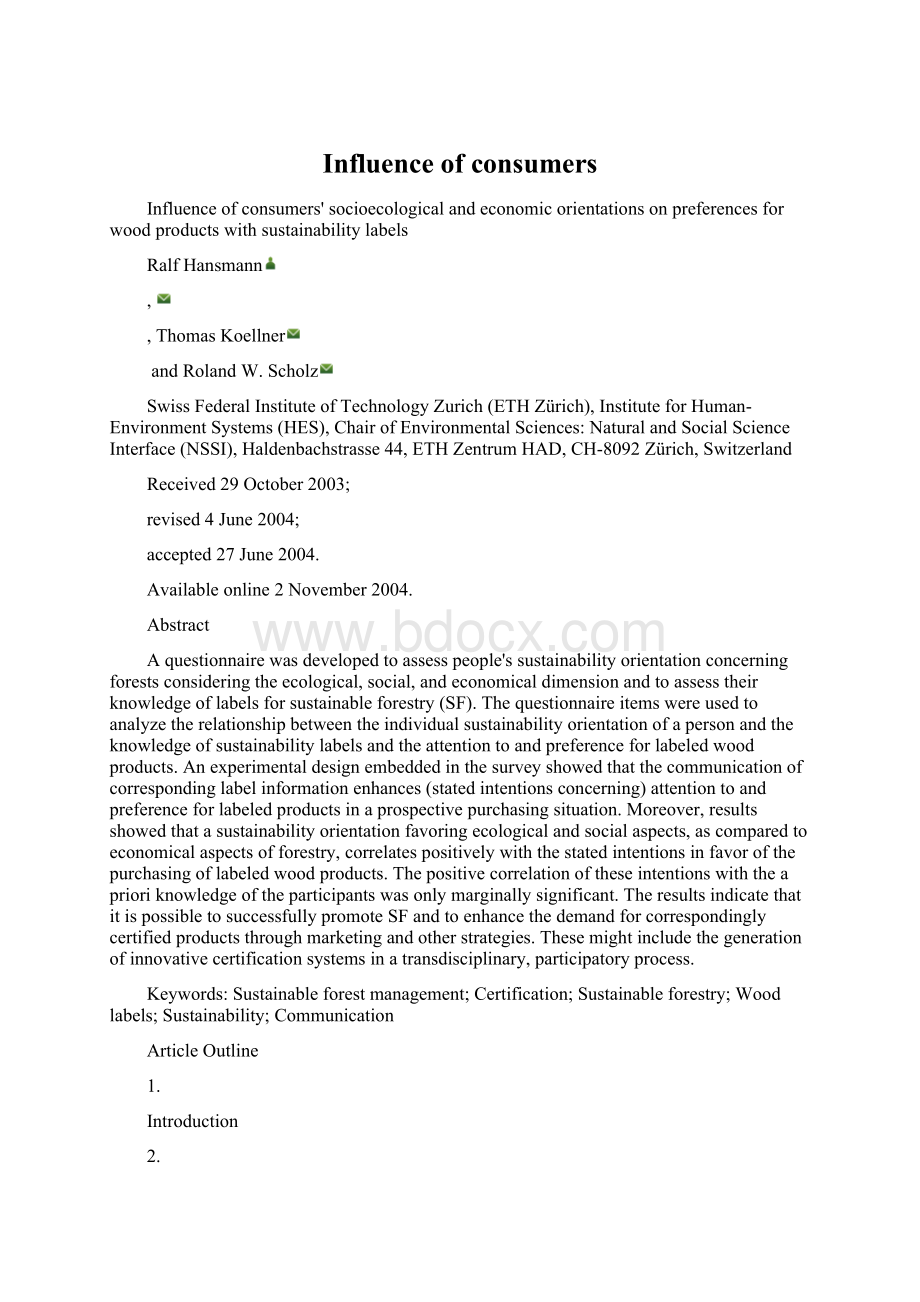Influence of consumers.docx
《Influence of consumers.docx》由会员分享,可在线阅读,更多相关《Influence of consumers.docx(19页珍藏版)》请在冰豆网上搜索。

Influenceofconsumers
Influenceofconsumers'socioecologicalandeconomicorientationsonpreferencesforwoodproductswithsustainabilitylabels
RalfHansmann
ThomasKoellner
andRolandW.Scholz
SwissFederalInstituteofTechnologyZurich(ETHZürich),InstituteforHuman-EnvironmentSystems(HES),ChairofEnvironmentalSciences:
NaturalandSocialScienceInterface(NSSI),Haldenbachstrasse44,ETHZentrumHAD,CH-8092Zürich,Switzerland
Received29October2003;
revised4June2004;
accepted27June2004.
Availableonline2November2004.
Abstract
Aquestionnairewasdevelopedtoassesspeople'ssustainabilityorientationconcerningforestsconsideringtheecological,social,andeconomicaldimensionandtoassesstheirknowledgeoflabelsforsustainableforestry(SF).Thequestionnaireitemswereusedtoanalyzetherelationshipbetweentheindividualsustainabilityorientationofapersonandtheknowledgeofsustainabilitylabelsandtheattentiontoandpreferenceforlabeledwoodproducts.Anexperimentaldesignembeddedinthesurveyshowedthatthecommunicationofcorrespondinglabelinformationenhances(statedintentionsconcerning)attentiontoandpreferenceforlabeledproductsinaprospectivepurchasingsituation.Moreover,resultsshowedthatasustainabilityorientationfavoringecologicalandsocialaspects,ascomparedtoeconomicalaspectsofforestry,correlatespositivelywiththestatedintentionsinfavorofthepurchasingoflabeledwoodproducts.Thepositivecorrelationoftheseintentionswiththeaprioriknowledgeoftheparticipantswasonlymarginallysignificant.TheresultsindicatethatitispossibletosuccessfullypromoteSFandtoenhancethedemandforcorrespondinglycertifiedproductsthroughmarketingandotherstrategies.Thesemightincludethegenerationofinnovativecertificationsystemsinatransdisciplinary,participatoryprocess.
Keywords:
Sustainableforestmanagement;Certification;Sustainableforestry;Woodlabels;Sustainability;Communication
ArticleOutline
1.
Introduction
2.
Methodandhypothesis
2.1.Content,procedure,andexperimentaldesignofthesurvey
2.1.1.Assessmentofindividualsustainabilityorientations
2.1.2.Assessmentofknowledgeofwoodlabels
2.1.3.Experimentalmanipulationandassessmentoftwodependentvariables
2.2.Constructionofascaleformeasuringindividualtendenciesofweighingecologicalandsocialaspectsofforestsascomparedtoeconomicaspects
2.3.Hypotheses
2.3.1.Absoluteweighingofecological,social,andeconomicaspectsofforests
2.3.2.Weighingofecologicalandsocialvs.economicaspectsofforestsandpurchasingintentionsforwoodproductswithsustainabilitylabels
2.3.3.Knowledgeconcerningsustainabilitywoodlabelsandpurchasingintentionsforcorrespondingwoodproducts
2.3.4.Effectsofinformationaboutsustainabilitylabelsonpurchasingintentionsforcorrespondingwoodproducts
3.
Results
3.1.Absoluteweighingofecologicalandsocialvs.economicaspectsofforests
3.2.Levelofknowledgeonwoodlabels
3.3.Effectsofsustainabilityorientation,labelknowledge,andcommunicationonpurchasingintentionsforlabeledwoodproducts
4.
Conclusion
References
1.Introduction
ThisarticletakesaSwissperspectiveoncertificationcriteriaforthesustainabilitylabelingoftimberproducts,onthesustainabilityorientationofindividuals,theirknowledgeaboutsustainableforestry(SF)labelsandtheirpurchasingintentionsconsideringtheselabels.ConclusionsforthedevelopmentofSFlabelsandcertificationcriteriaandforcorrespondingmarketingandcommunicationstrategieswillbediscussed.Inlightofincreasingglobalizationandliberalizationofthemarkets,thepossibilitiesoftransferringmarketingstrategiesfromanationalperspectivetoothernationalperspectivesandtoaninternationallevelareofgreatinterestandpracticalrelevance(Bruhn,1997).ThereadersarethusencouragedtoengageinacomparisonofthesituationandproblemsinSwitzerlandwiththeirowndomesticsituationandtoconsiderthetransferabilityoftheviewpointsoncertificationcriteriaandeco-labelmarketingpresentedinthisarticle.
Acomprehensiveconceptofsustainabilityencompassesecological,social,andeconomicaspects(WorldCommissiononEnvironmentandDevelopment,1987andRenn,1996).Thesethreedimensionsarealsoapplicabletothesustainabilityofforestmanagement(VanMansveldandvanderLubbe,1999,Kissling-Näf,2000,SuterThalmann,2000,Eidetal.,2001andKrott,2002).ThecertificationoftimberfromSFandtheuseofcorrespondinglabelscommunicatetotheconsumersthestandardsthathavebeenfollowedintheproductionofthewood.Asgenerallyholdstrueforbrandlabelsofproducts(Bruhn,1997andMüller-Hagedorn,1997),fromaneconomicperspective,theuseofSFlabelsisaimingatpotentialmarketadvantages(Rametsteiner,2002,p.163).Thebasicideaisthat,ifthereexistsafitbetweenthestandardscommunicatedbythelabelandthestandardsornormsofpotentialconsumers,thedemandoftheseconsumersforthelabeledproductswillincreaseascomparedtotheirdemandfornonlabeledproducts.ThepersonalinvolvementandinterestconcerningSF,thecommitmentoftheconsumerstothestandardsofacertainlabelandthetrustwhichconsumershaveinaSFlabelappeardecisiveindeterminingconsumer'sbrandloyalty(Fukuyama,1995,Blomqvist,1997andChaudhuriandHolbrook,2001).Trustseemsparticularlyimportantinthiscontextbecausetheconsumersofwoodproductsarenotabletorecognizedirectlytheecologicalandsocialstandardswhichhavebeenmetwhenthewoodwasproduced(WeiberandAdler,1995).Thus,trustworthinessrepresentsaprerequisiteforanSFlabeltobesuccessfulinthemarket(BarneyandHansen,1994).AccordingtoDelgado-BallesterandMunuera-Aléman(2001),theinfluenceofconsumer'sbrandtrustonbrandloyaltyasmeasuredinconsumer'scommitmentandpricetoleranceisparticularlystrong,consideringconsumptiondecisionswithhighpersonalinvolvement.
InSwitzerland,theinvolvementofthepopulationinquestionsofSFisassuminglystrongerthaninmanyothercountries.ThisissuggestedbythestrongpositiveecologicalattitudesandthehighenvironmentalconcernoftheSwiss(DiekmannandFranzen,1999andFranzen,2003)bytheirextensiveuseofforestsforrecreationalactivities(SchmithüsenandWild-Eck,2000,SuterThalmann,2000andWild-Eck,2001)andbytheevidentprotectivefunctionsoftheSwissforests,inparticular,consideringavalanches.Moreover,theextremelyhighlevelofsubjectivelyperceivedpoliticalparticipationoftheSwiss(Paldam,2000)—whichispresumablyfavoredbytheSwissFederalismandbytheconstitutionalelementsofdirectdemocracy—mightalsocontributetotheirpersonalinvolvement.
AsurveyoftheSwissFederalAgencyofEnvironment,ForestsandLandscape(BundesamtfürUmwelt,WaldundLandschaft[BUWAL],1999)showedthatconsideringSFcertification,theSwiss(would)haveconsiderabletrustininternationalenvironmentalorganizations,intheBUWAL,andintheorganizationsrepresentingtheSwissforesteconomyandtimberindustry.However,theywouldhavelesstrustinthecompaniesmanufacturingthewoodproducts,intheadministrationsofforeigncountriesandoftheEuropeanCommunity,andineconomicorganizationsontheEuropeanlevel.
Acompetitiveadvantageofcompaniespossessingcertificatesformatchingecologicalstandardscan,inthelongrun,createaspilloverofpositiveecologicaleffectsasfurthercompaniesmighttrytofulfillthestandardsofsuchcertificates.Suchpositiveecologicalspillovereffectsareabasicideaofecologicallabelsfromtheecologicalperspective.Withrespecttosustainabilitylabels,afitbetweenthestandardsofalabelandthestandardsoftheconsumermightbedescribedbyapositiveattitudeoftheconsumertowardsthestandardsguaranteedbythelabel,whichbasesontheidentityorsimilarityofthevaluesoftheconsumerandthevaluesunderlyingthecertificationcriteria.Thisfitcanleadtopositiveidentificationwiththelabel,toeffectivecommitment,andattitudinalloyalty(DickandBasu,1994,Gundlachetal.,1995andChaudhuriandHolbrook,2001).Accordingly,consumershavinghighstandardsconcerningprotectionoftheenvironmentwillpreferproductswithecologicallabels,whichemphasizetheecologicalproductionoftheseproducts.Consumershavingstronginternalstandardsconcerningsocialaspectswilltendtopreferproductswithlabelsthatemphasizesocialstandards,suchasfairtradelabels.Therefore,itappearsinterestingtomeasurepeople'sindividualtendenciesconcerningtherelativeimportancetheyattachtothethreesustainabilitydimensionsandtosubsequentlyrelatethismeasurementtopreferencesforlabeledwood.Adirectquestioningofpersonsconcerningthepersonalweightingofecological,social,andeconomicaspectsdoesnotseemtobeappropriateforthisassessment,astheseconceptsareveryabstractandbecausepre-orunconsciousinfluencesoncognitioncanhavedistortingeffectsontheanswers(HuberandMandel,1994andSchutt,1999).Similartopsychologicaltests,thedevelopmentofastandardizedquestionnaireappearsappropriate,withscalesthatmeasuretheseabstractconceptsthroughvariousitems.Forthepresentstudy,acorrespondingquestionnairewasdeveloped,whichshouldmeasureaperson'ssustainabilityorientationconcerningforestsandwhich,consequently,shouldbeable,atleasttosomeextent,topredictthestatedintentionsofconsumerstoprefertimberproductsthatarelabeledwithcertificatesemphasizingecologicallyandsociallyappropriatewoodproduction.
A